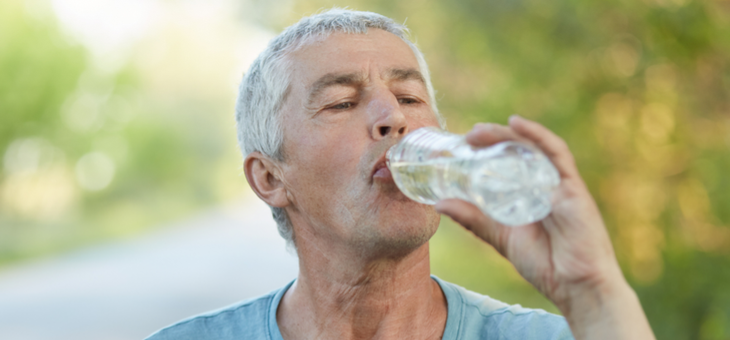In the heat of summer, it can take as little as 30 minutes to become dehydrated. But it’s not just the heat that can dry you out.
Air-conditioning or even just sitting in front of a fan for extended periods can do the job of dehydrating you just as quickly.
Dehydration can be subtle, but it can turn into a serious health concern. While there are many opinions on how much water you need to drink on average each day to stay properly hydrated, different hydration requirements among people will vary. However, making sure you drink at least a few glasses of water each day should help to stave off the effects of dehydration.
From minor symptoms such as having trouble concentrating, thirst and a dry mouth, to more serious concerns such as nausea, headaches, heat stroke and fever, dehydration affects people in different ways. Dehydration can become so bad that you can land in hospital.
So, how can you tell if you’re dehydrated? Here are nine signs to look out for.
1. Increased thirst and a dry sticky mouth
If you feel thirsty, then you’re already dehydrated. While it’s not advisable that you ever get to this point, you should immediately start sipping water and beverages with electrolytes (minerals in the blood such as sodium, potassium and magnesium, among others, that assist bodily functions). The best way to avoid thirst is to consume around two to three litres of water each day through foods or the trusty glass. Drink more if you’ve spent considerable time in the sun or have been exercising.
2. Tiredness, confusion and anger
Mild levels of dehydration affect your mood, energy and thinking ability. This is especially the case for older people.
3. Dry eyes and blurred vision
Losing fluids can affect your eyes, which typically require moisture to operate properly. Having trouble reading? Grab a glass of water.
4. Headaches, dizziness and disorientation
A classic symptom of dehydration is headaches, which can quickly turn into migraines. If you begin to feel a little light-headed or even slightly delirious – for example, if you have trouble stringing words together – you may be dehydrated, too. Weakness and nausea will soon ensue, so get some fluids into you before these symptoms become more serious.
5. Cramping
If your legs feel tired, you’re probably dehydrated. Once your legs or feet begin to cramp or you experience tightness in your muscles, that’s a serious sign of your body losing fluids.
Once this happens, head to the store and grab a sports drink, or mix half a teaspoon of salt into a glass of room-temperature water. The sodium will help retain water in your body and allow it to rehydrate.
6. Not sweating
Lack of sweat during exercise or in the heat is a serious sign of dehydration. You need to sweat to cool down, and if you can’t do this you may overheat, causing heat stroke or worse. Basically, no sweat means your body is in dire need of water.
7. Dark-coloured urine
The lighter your urine the more water you have in your system. Darker colours, such as orange or even brown means you need water. If your urine is perfectly clear, it may mean you’re over-hydrated.
8. Fever
Serious dehydration can lead to fever, chills or even hyperthermia. This is a red flag and if you experience either symptom, stop what you are doing, sit down and sip water until you cool down.
9. Dry skin
When you’re properly hydrated, your skin should appear full, elastic and ‘doughy’. Once dehydration sets in, you’ll lose that elasticity and your skin will appear thin and dry. To find out if this is the case, pinch the skin on the back of your hand and if it doesn’t bounce back or ‘melt’ back on to your body, then reach for a glass of H2O.
Tips:
Plain water is good for you, but experts recommend a combination of water, electrolytes and sodium to stay properly hydrated.
If you’re in the sun for too long, or exercise a little too strenuously, it’s important to know that you can still overheat, no matter how much water you drink.
Do you have any tips for staying hydrated in the hotter weather?
Related articles:
Can food give you bad dreams?
Are extra kilos a part of ageing?
Terrified of going to the toilet
Disclaimer: This article contains general information about health issues and is not advice. For health advice, consult your medical practitioner.

